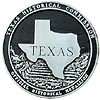| |
|
|
Salado Valley |
|
 |
|
San Antonio,
TX,
USA
Latitude & Longitude:
29° 22' 38.1",
-98° 25' 49.5984"
|
| |
| |
|
Texas State
Historical Marker |
Because of fertile soil and abundant water, was a favored dwelling place and hunting ground for south Texas Indian tribes in Pre-Columbian times. In 1709 Spanish explorers discovered and named Salado Creek; soon after, this valley beame a well-known resting and watering spot between San Antonio and all points east. In 1731, with the arrival in San Antonio of the Canary Islanders (the first civilian colonists), Salado Creek became a town boundary. In 1836 Mexican Gen. Santa Anna crossed the valley prior to defeat by Texan Revolutionary forces at San Jacinto. In 1842 the valley saw two other fights against Mexican troops: the victorious second battle of the Salado; and Dawson's Massacre, in which 33 Texans were slain attempting to reach safety. During the 19th century, Salado Valley was also crossed by the Goliad, Gonzales, Nacogdoches, and San Antonio roads--major travel arteries. The valley was a key to increasing United States military strength, 1876, when it became site of Fort Sam Houston. Other military units followed, including Brooks Air Force Base in 1917. Thus the valley has been an important factor in both the development and defence of Texas from Colonial to modern times.
This page last updated: 7/15/2008 |
Salado Valley Historical Marker Location Map, San Antonio, Texas
|
|
|
|


